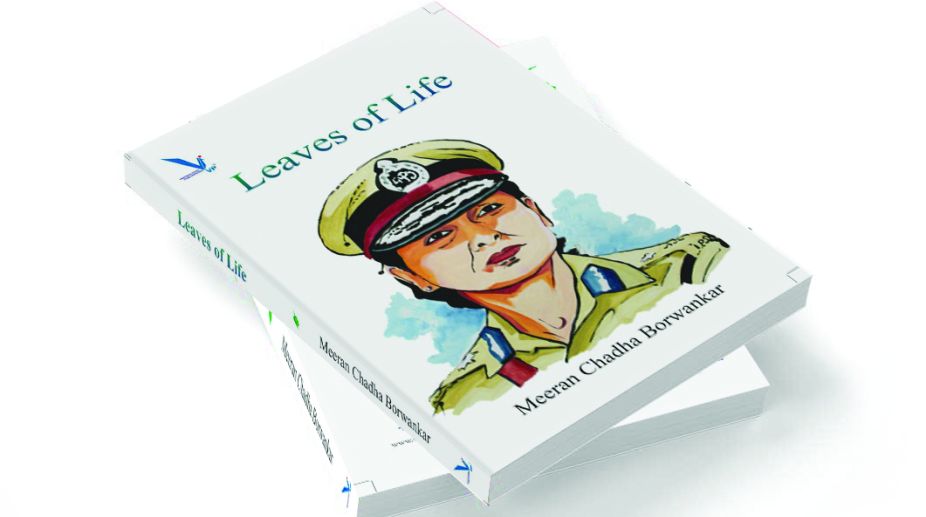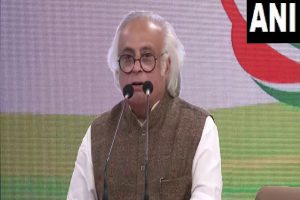The very idea of police as keepers of peace and protectors of public epitomised two principles — trustworthiness and fairness. But, with time there has been a worrying trend towards separation between police and the people they serve. The pendulum has swung considerably as some of the revelations of recent years and cover-up seriously challenged public confidence in the police. The book, Leaves of Life, by Meeran Chadha Borwankar, the only woman IPS officer of the 1981 batch came at a time when the police officers deserving of our respect are facing scorn increasingly.
It is tough to be a cop anywhere in the world today. And, more so when lack of respect for law enforcement agencies seems to be part of a general societal degradation. Meeran’s book, reflecting career-defining moments is not an antithesis to this perception as such, but a magnificently crafted, lucid and pragmatic personal story-telling by someone driven by personal beliefs and values.
Although the author’s intended audience is young girls and women in the age bracket of 14-25 years, Leaves of Life unhesitatingly is an all-age book that would certainly leave readers with inspiring insights. Meeran is indeed an incredibly intense persona.
Advertisement
The former IPS officer does not fully endorse the fact that one can just learn from one’s mistakes to avoid undesirable events in the future but believes that the effect of credible personal stories can often have deep impact on young minds. Thus the narrative for this 27-chapter book with lessons learnt and action points focusing on risk-taking, decision-making and the consequences of choices is essentially aimed towards steering young girls in the right direction that might help them along the way.
In a matter-of-fact manner, the book was set early when Meeran dedicated the work to her father stating when her father was asked in his retirement (from Punjab Police and BSF) why he didn’t build a house, his reply was he was busy building his children (four including the author).
The unusual candour of the author’s story-telling lies in the fact when she writes that as she was from a small town and schools with non-convent backgrounds, she learnt English while focusing on career advancement. While training in the National Police Academy, it was perhaps for her pronunciation, a fellow probationer, commented “Meeran speaks English in Punjabi”.
The book offers several reflective accounts of the author’s journey from a lesser known school in Fazilka, Punjab to be the first woman Superintendent of Police (Aurangabad and Satara districts), Commissioner of Police (Pune) in Maharashtra and finally Director-General, Bureau of Police Research and Development, Delhi ns is therefore astoundingly remarkable. Remarkable still is the story of her endurance power as Meeran coordinated a long-distance major rescue operation while travelling from Pune to Lilavati Hospital, Mumbai for her own major surgery.
On a deeper level, Meeran’s book often forces one to refer to what Graham Campbell once observed. The former officer with the New York Police Department, put it, “That’s what a cop’s job is: to swallow the sorrows of humanity ~ from the banal to the truly tragic — and to return to work the next day and do it all over again.”
While there are so many in the police who demonstrate superior principles in both thought and deed — both on and off duty — there are many black sheep too like in any other profession. The author although spoke briefly about the need for weeding out them, but some more details, a dedicated chapter perhaps, about those who betray the public’s trust would have been useful at least for those aspiring to be a police officer. Negative perceptions of policemen and women do unnerve honest officers. More so, if we bear in mind what Doug Wyllie, Police One Senior Contributor and a member of the International Law Enforcement Educators and Trainers Association wrote in an article a few years back, “When one cop is found out to be dirty, it besmirches the badge for the 99.99 per cent of officers out there doing the right thing, at the right time, for the right reasons.”
According to 37-year-old Sammy Ondimu Ngare, a gallant police officer of the Kenya Police Service who uses gospel music as an extra cache in the fight against evil and crime, “We don’t all have the same entry point into life. As I keep driving, I pass some other cars, while other cars would pass me. We don’t all have the same exit point. We are all on this journey called life. We will enter at different points and exit at different points, but one thing is clear: we will all exit this road at one point in time or the other. It may be a 10km run God has given you, or it could be 100,000kms; what is important is that you run your race well.”
Leaves of Life provides a riveting and assertive account of retired IPS officer Meeran Chadha Borwankar. It is an invaluable guide to run the race well.
(The reviewer is a freelance contributor)
Advertisement











